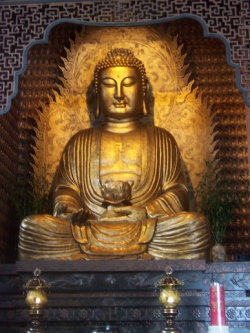Difference between revisions of "Araha.m Sutta"
| (One intermediate revision by the same user not shown) | |||
| Line 1: | Line 1: | ||
{{DisplayImages|3418|3160}} | {{DisplayImages|3418|3160}} | ||
{{Centre|{{Big2x|The Arahant}}<br/> | {{Centre|{{Big2x|The Arahant}}<br/> | ||
| − | translated from the Pali by <br/> | + | translated from the [[Pali]] by <br/> |
Maurice O'Connell Walshe}}<br/><br/> | Maurice O'Connell Walshe}}<br/><br/> | ||
| − | [Deva:] | + | [ [[Deva]]:] |
| − | He who's an Arahant, his work achieved, | + | He who's an [[Arahant]], his work achieved, |
| − | Free from taints, in final body clad, | + | Free from [[taints]], in final [[body]] clad, |
| − | That monk still might use such words as "I." | + | That [[monk]] still might use such words as "I." |
Still perchance might say: "They call this mine." | Still perchance might say: "They call this mine." | ||
| Line 16: | Line 16: | ||
... | ... | ||
| − | Would such a monk be prone to vain conceits? | + | Would such a [[monk]] be prone to vain conceits? |
| − | [The Blessed One:] | + | [The [[Blessed One]]:] |
Bonds are gone for him without conceits, | Bonds are gone for him without conceits, | ||
| Line 24: | Line 24: | ||
All delusion's chains are cast aside: | All delusion's chains are cast aside: | ||
| − | Truly wise, he's gone beyond such thoughts.[1] | + | Truly [[wise]], he's gone beyond such [[thoughts]].[1] |
| − | That monk still might use such words as "I," | + | That [[monk]] still might use such words as "I," |
Still perchance might say: "They call this mine." | Still perchance might say: "They call this mine." | ||
| − | Well aware of common worldly speech, | + | Well {{Wiki|aware}} of common [[worldly]] {{Wiki|speech}}, |
He would speak conforming to such use.[2] | He would speak conforming to such use.[2] | ||
| Line 36: | Line 36: | ||
==Notes== | ==Notes== | ||
| − | 1. Ya.m mata.m: "whatever is thought." Mrs Rhys Davids's emendation of yamata.m in the text (paraphrased as "conceits and deemings of the errant mind," following the Commentarial maññana.m "imagining"). | + | 1. Ya.m mata.m: "whatever is [[thought]]." Mrs Rhys Davids's emendation of yamata.m in the text (paraphrased as "conceits and deemings of the errant [[mind]]," following the {{Wiki|Commentarial}} maññana.m "[[Wikipedia:Imagination|imagining]]"). |
| − | 2. Cf. DN 9: "These are merely names, expressions, turns of speech, designations in common use in the world, which the Tathaagata uses without misapprehending them." | + | 2. Cf. DN 9: "These are merely names, {{Wiki|expressions}}, turns of {{Wiki|speech}}, designations in common use in the [[world]], which the [[Tathaagata]] uses without misapprehending them." |
{{R}} | {{R}} | ||
[http://www.dhammawiki.com/index.php?title=Category:Samyutta_Nikaya dhammawiki.com] | [http://www.dhammawiki.com/index.php?title=Category:Samyutta_Nikaya dhammawiki.com] | ||
[[Category:Araham Sutta]] | [[Category:Araham Sutta]] | ||
Latest revision as of 20:21, 3 April 2014
The Arahant
translated from the Pali by
Maurice O'Connell Walshe
[ Deva:]
He who's an Arahant, his work achieved,
Free from taints, in final body clad,
That monk still might use such words as "I."
Still perchance might say: "They call this mine."
...
Would such a monk be prone to vain conceits?
[The Blessed One:]
Bonds are gone for him without conceits,
All delusion's chains are cast aside:
Truly wise, he's gone beyond such thoughts.[1]
That monk still might use such words as "I,"
Still perchance might say: "They call this mine."
Well aware of common worldly speech,
He would speak conforming to such use.[2]
Notes
1. Ya.m mata.m: "whatever is thought." Mrs Rhys Davids's emendation of yamata.m in the text (paraphrased as "conceits and deemings of the errant mind," following the Commentarial maññana.m "imagining").
2. Cf. DN 9: "These are merely names, expressions, turns of speech, designations in common use in the world, which the Tathaagata uses without misapprehending them."

